How Much Melatonin Should I Take? How to Find Your Optimal Dose
Melatonin is an indispensable molecule found in most plants and living organisms. As an antioxidant, anti-inflammatory, and anti-cancer agent, it contributes to a wide range of functions within the body. Yet melatonin is still best known for its role in improving sleep and reducing jet lag.
After several years of testing Omega Restore – a combination of omega-3 fatty acids, melatonin, and vitamin D3 – we have a firm idea of how this combination supports our customers’ sleep patterns.
We want to share what we’ve learned to date with you and compare our experience to the findings discussed in scientific reviews of melatonin.
How Much Melatonin Do You Need?
Omega Restore users will note that all of our vials contain the same amount of vitamin D3 and omega-3 fatty acids: 1400 IUs of vitamin D3 and 3000 mg of EPA/DHA.
When it comes to melatonin, however, there are significant dose variations from one person to another. Studies use anywhere between 1 – 100 mg of melatonin per day to document clinical effects. Furthermore, it appears that the same dose given to individuals can have very different outcomes. Consider, for instance, one study, which found that the same 10 mg melatonin dose given to a group of people could cause over 50 times higher levels of melatonin in the blood from one person to the next (2).
“How Much Melatonin Should I Take?”
We’ve noticed the same dose discrepancy in our customer feedback. Some people feel knocked out – or show signs of taking too high a dose – with only 2 mg. Others say they only feel effects with 15 mg of melatonin a night. In spite of the variation, however, around 60% of our customers find that 5 mg works best, while the rest divide evenly between the higher and lower doses.
At night, the pineal gland produces melatonin in response to darkness.
This dose variation will constitute one of the biggest challenges for melatonin research in the future since most clinical trials typically use one fixed dose. This may mean that a large number of participants will either get too high or too low a dose, impacting the results of the study.
The good thing though is that melatonin seems to be safe even in people who may be taking too high a dose for their needs. Studies routinely use between 20 – 100 mg/day with no reported safety issues (3).
Why Do People Need Different Doses of Melatonin?
The pineal gland naturally produces melatonin to help regulate our circadian rhythm. And because melatonin is naturally produced by the body, the melatonin dose a person may need is influenced by a number of individual factors, including:
Age
As a person ages, the amount of melatonin their pineal gland produces also decreases. For instance, studies show that between 62% – 72% of people ages 58+ experience pineal gland calcification, which is also associated with lower melatonin production (4).
Diet & Lifestyle
Diet may also play a role in terms of optimal dose, particularly since certain foods – including tomatoes, fish, olives and walnuts – contain notable amounts of melatonin (5).
On the flip side, certain types of medications, such as beta-blockers and NSAIDs, are known to knock out the body’s melatonin balance (3, 6). Similarly, light pollution and exposure to electronics at bedtime can also impede melatonin secretion (7).
Bioavailability
To complicate matters, the bioavailability of consuming melatonin tablets is famously low, ranging from 3 to 33 percent (2). Bioavailability may also be influenced by other factors, like the amount of enzymes breaking down the molecule and the amount of liquid present when the melatonin is absorbed (8).
Regulating sleep is only a small part of what melatonin does. In this video, we discuss the science of melatonin and how its functions are deeply tied to the benefits of omega-3 fatty acids.
What Are the Benefits of Melatonin for Sleep?
Studies consistently show that melatonin can help you fall asleep faster and sleep more effectively – but not necessarily increase total sleep time.
Melatonin has also been used effectively to shift sleep schedules, which can be beneficial for people with Delayed Sleep Phase Syndrome (DSPS) and jet lag (9).
For REM sleep behavior disorder (RBD) – which is characterized by abnormal, often violent body movements during sleep – scientists reported major benefits from taking melatonin. This included a marked decrease in muscle tension during REM cycles (3).
Omega Restore users have frequently commented on similar body-calming effects, even in people without RBD. Partners often report their significant other tends to sleep with less movement and tossing around, as well as snore less and breathe more quietly.
Can You Overdose on Melatonin?
Compared to over-the-counter medications and even other supplements, melatonin has an extraordinary safety record over a wide range of doses.
If a person gets too much melatonin, however, they may experience some unpleasant effects. Customers report that if they get too high a dose, they might wake up early, wake up frequently during the night, or in a few cases, not to sleep at all. Vivid dreams or nightmares are other symptoms.
On the positive side, these are not long term effects. Since melatonin concentrations usually return to normal levels within 4 to 8 hours of taking a regular dose (10), side effects typically only impact that night.
In addition, melatonin’s effects are strongly dose dependent. If a person gets too high a dose one night, we regularly see that reducing the dose the following evening will also diminish the side effects.
Since your sleep is influenced by more than melatonin, don’t give up after just one night if you don’t experience the desired effects immediately. We recommend trying your starting dose for 5 – 7 days before determining whether you need to adjust the amount of melatonin.
Studies show that melatonin can help you fall asleep faster and sleep more effectively – but not necessarily increase sleep time.
What Is the Best Time to Take Melatonin?
Melatonin is not a sleep aid; it’s a sleep regulator. What this means is that melatonin signals to your body that it’s time to sleep, but it does not sedate you, like typical sleep medicines.
Because of this distinction, it’s important to pay attention to timing when taking melatonin.
The best time to take melatonin may in part depend on the situation. For instance, scientists are currently exploring the optimal time to take melatonin for people working overnight shifts. For improving sleep quality at a regular bedtime, however, several reviews recommend taking melatonin between 30 to 60 minutes before sleeping (9, 10, 11).
Finding the Right Melatonin Dose with Omega Restore
Working with customers has made me formulate this general guideline to finding your optimal Omega Restore dose:
• Start with the lowest dose and work your way up as necessary. We typically recommend starting with a 2 mg dose and increasing from there as needed.
• If you do not feel any difference in your sleep pattern after 5 to 7 days, increase the dose.
• If you get too high a dose — meaning, you experience frequent or early waking — then reduce the dose. You can always reduce the dose by taking half a vial (or by diluting it with Omega Cure Extra Strength).
When you find the best dose for you, you should wake up feeling refreshed in the morning, as well as feel less stressed and tired during the day. When you have found this personal ‘best’ dose, there doesn’t seem to be much change over time.
Personally, I increase my nightly dose while traveling internationally. This seems to take away any jet lag issues. If I feel after some time that Omega Restore seems to work less, then I skip taking the vial for a few days for the body to break down any surplus.
If you have questions about using Omega Restore or finding your right dose, give us a call at 866.414.0188 or leave a comment below.
For More Restful Sleep and Energy
Experience the Omega3 Innovations difference for yourself with the most effective fish oil supplement on the market.
Buy Now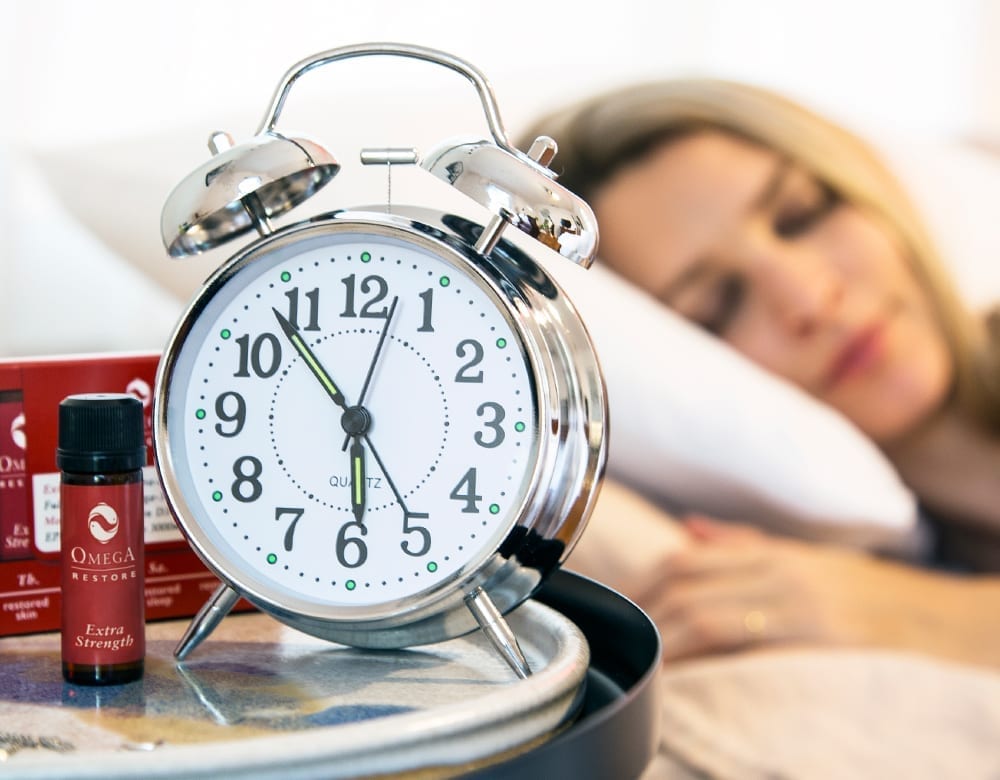
References:
1. Fabian, C. J., Kimler, B. F., & Hursting, S. D. (2015). Omega-3 Fatty Acids for Breast Cancer Prevention and Survivorship. Breast Cancer Research : BCR, 17(1), 62.
2. Andersen, L. P., Gogenur, I., Rosenberg, J., & Reiter, R. J. (2016). Pharmacokinetics of Melatonin: The Missing Link in Clinical Efficacy? Clinical Pharmacokinetics, 55:1027–1030.
3. Xie, Z. et al. (2017). A Review of Sleep Disorders and Melatonin. Neurological Research, 39 (6): 559-565.
4. Dan, D. X., Xu, B., Zhou, X., & Reiter, R. J. (2018). Pineal Calcification, Melatonin Production, Aging, Associated Health Consequences and Rejuvenation of the Pineal Gland. Molecules, 23(2), pii: E301.
5. Peuhkuri, K., Sihvola, N., & Korpela, R. (2012). Dietary Factors and Fluctuating Levels of Melatonin. Food & Nutrition Research, 56, 10.3402/fnr.v56i0.17252.
6.Zisapel N. (2018). New Perspectives on the Role of Melatonin in Human Sleep, Circadian Rhythms and Their Regulation. British Journal of Pharmacology, 175(16), 3190–3199.
7. Reiter, R. J. (2013). “Melatonin’s role in Cancer.” Department of Cellular and Structural Biology – University of Texas. https://youtu.be/2DcLnIFXzoE
8. Andersen, L. P. et al. (2016). Pharmacokinetics of Oral and Intravenous Melatonin in Healthy Volunteers. BMC Pharmacology and Toxicology, 17(8).
9. Arendt, J. (2019). Melatonin: Countering Chaotic Time Cues. Frontiers in Endocrinology, 10: 391.
10. Tordjman, S., Chokron, S., Delorme, R., Charrier, A., Bellissant, E., Jaafari, N., & Fougerou, C. (2017). Melatonin: Pharmacology, Functions and Therapeutic Benefits. Current Neuropharmacology, 15(3), 434–443.
11. Buckley, A. W. et al. (2020). Practice Guideline: Treatment for Insomnia and Disrupted Sleep Behavior in Children and Adolescents with Autism Spectrum Disorder. Neurology, 10.1212/WNL.0000000000009033.
Recent Posts
-
Dose, Joint Health, Omega-3
Omega-3 & Pain Relief: Finding the Best Strategy
Are you one among the 1 in 5 Americans grappling with chronic pain, as reported by the CDC [1]? If the thought of traditional pain medications and their potential side...3 months ago -
Eye Health, Omega-3
The Startling Link Between Skin Care and Eye Health
Dry eye complaints are on the rise worldwide. Many risk factors – including aging and increased computer use – help explain the increase. But there's another driver few people know...5 months ago -
Heart Health
Does Taking Fish Oil Lower Cholesterol?
Many people believe that incorporating omega-3s into their diet will solve their cholesterol woes. But the truth is much more nuanced; it's not as simple as taking a daily fish...1 year ago -
Immune Health, Sleep
Melatonin & COVID-19: Can This ‘Sleep Hormone’ Help?
It started with a runny nose and a slight cough. But when his 72-year-old wife tested positive for COVID-19, he got concerned. “Is there any research suggesting the supplements we...2 years ago -
Full-Spectrum Fish Oil, Omega-3
Is It Good to Store Fish Oil in the Freezer?
Fish oil is a great source of the omega-3 fatty acids we all need for good health. It’s also highly perishable. Consuming rancid fish oil can have negative health implications....2 years ago -
Omega-3
Our Favorite Omega-3 Fish Oil Benefits
Omega-3 fish oil certainly has a reputation for delivering a plethora of incredible benefits. And it’s true! Omega-3 fatty acids have been studied for a broad range of health conditions....2 years ago

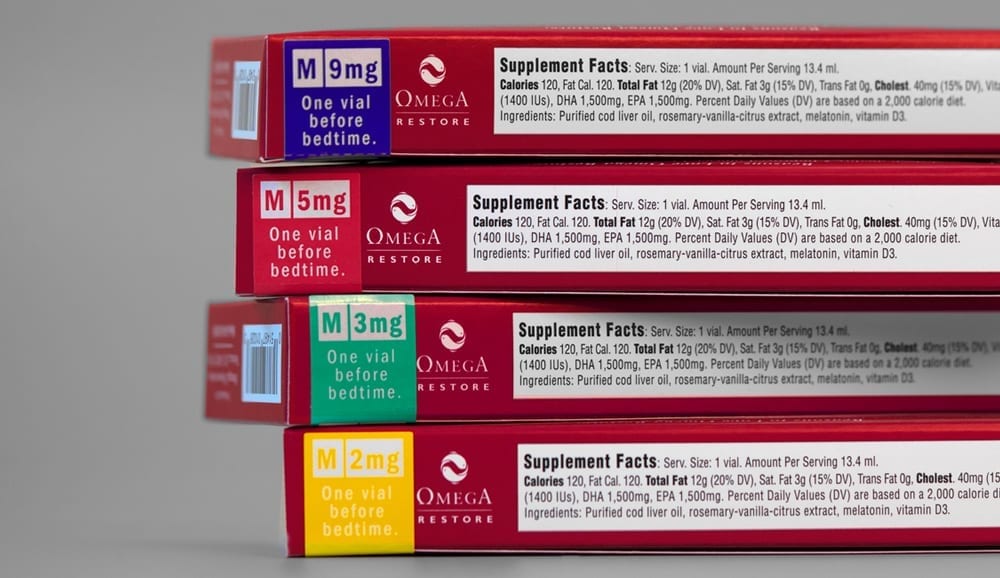
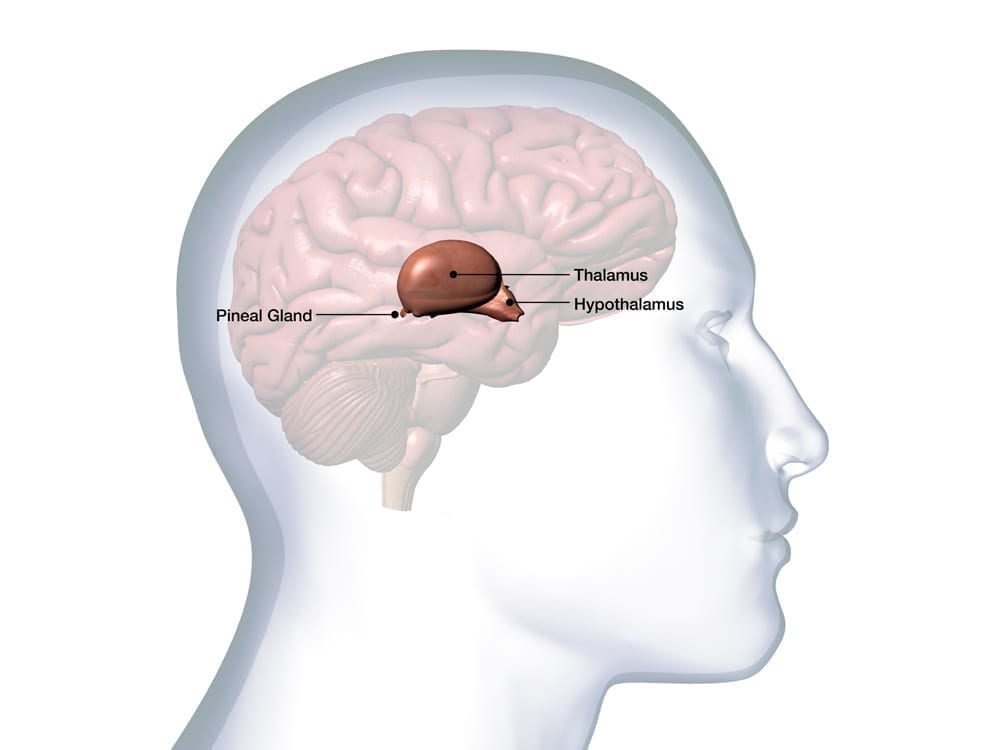
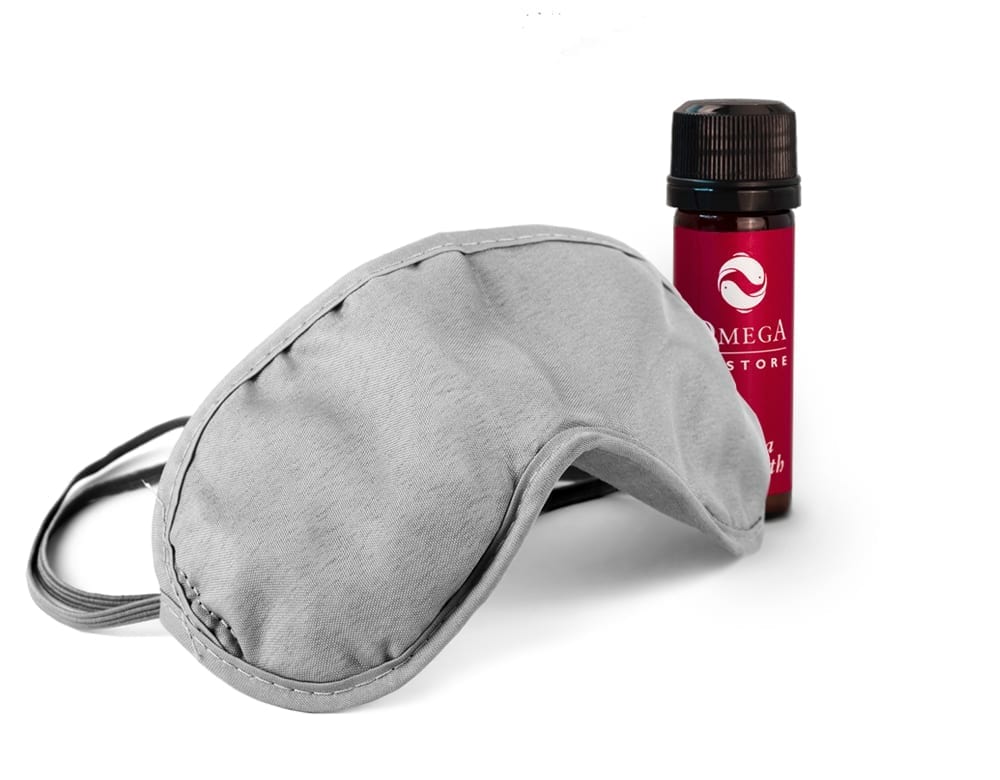



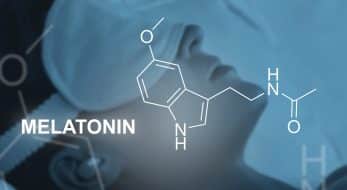


Comments (9)
I was interested in learning if taking melatonin daily decreases your bodies own natural production of melatonin over time?
It’s a good question. Looking at the research, studies show that people’s sleep patterns return to their pre-treatment base levels after they stop taking melatonin, indicating the body’s natural melatonin level is not impacted in the long-term. In addition, most studies and reviews note that melatonin does not cause any withdrawal or dependence symptoms, unlike other sleeping agents.
I have been on the Omega Restore with 5mg of melatonin. I have noticed no difference with my sleeping pattern. I wake up often. I have found that when I take the dose that in an hour I am ready for sleep. I need to re-order and I am not sure whether I should order a higher dose and also some with the 5mg. I would be very grateful if you could assist me I need to order soon and don’t want to run out.
Many thanks
Carol
Hi Carol, Thank you for sharing this with us. We’d be happy to help sort out the best dose for you. Someone from our team will be in touch today. We look forward to continuing the conversation!